BIG STORY
Federal Government, NNPCL Work Out N7.7tn Fuel Subsidy Debt Payment
Published
5 months agoon
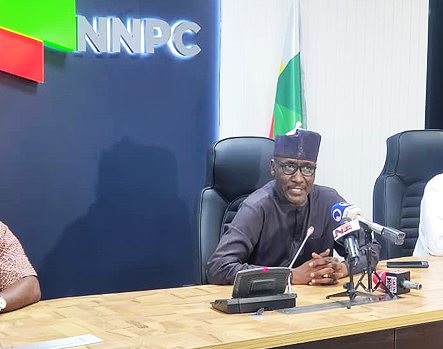
The Federal Government’s debt to the Nigerian National Petroleum Company Limited as exchange rate differential (subsidy) for importing Premium Motor Spirit (petrol) rose to N7.74tn as of September 2024, following the full implementation of downstream oil sector deregulation.
This amount represents the cost of maintaining a fixed price range in the retail market, despite purchasing the product at a higher price between June 2023 and September 2024.
The information was revealed in a presentation by the national oil company to the Federation Account Allocation Committee (FAAC) at its February meeting in Abuja. A copy of the document was obtained by our correspondent on Monday.
According to the FAAC document, the government is planning to clear the N7.74tn fuel subsidy debt within 210 days.
In August 2024, The Punch exclusively reported that the NNPCL requested a refund of N4.71tn from the government to cover outstanding debts used to import petrol.
At the time, the claim was recorded as “Exchange rate differential on PMS and other joint venture taxes” on products imported between August 2023 and June 2024.
Exchange rate differentials refer to the profit or loss resulting from the difference in value between two currencies at different times during foreign exchange transactions.
For instance, if $1 is exchanged for N1,600 today and N1,500 tomorrow, the exchange rate differential is the difference between both rates.
The government supported fuel imports by covering the gap between the projected rate and the actual cost borne by the NNPCL for importing petroleum products.
This price difference, which should ordinarily reflect in the retail price paid by consumers, is now the amount NNPCL is seeking to recover from the government.
An analysis of the document indicated that the exchange rate differential for July to September 2024 was calculated using the Nigerian Autonomous Foreign Exchange Market rate.
The document stated: “Thus, the actual differentials may change in line with the prevailing forex (foreign exchange) rate at the time of import settlements.”
The balance brought forward represents additional claims due to the actualisation of an estimated portion of 2017 to May 2023 PMS under-recovery.
A breakdown showed that the total exchange rate differential amounted to N10.499tn, with N2.756tn recovered between November 2023 and September 2024, reducing the outstanding balance to N7.74tn.
The document further explained that the weighted average of purchased USD as of February 7, 2025, was applied, and the payment is ongoing within 210 days.
The month-by-month breakdown showed that the debt rose from N1.29tn in May 2023 to N1.81tn by October 2023, increasing steadily to N7.74tn by September 2024.
The amount represents 14.07 per cent of the N54.99tn 2025 national budget.
During his inauguration on May 29, 2023, President Bola Tinubu declared that “subsidy is gone”, marking the end of a policy that had hindered economic growth.
However, global organisations such as the International Monetary Fund and World Bank claimed that fuel subsidies were quietly reintroduced.
A proposed economic stabilisation plan document in June 2024 indicated that the government planned to spend around N5.4tn on fuel subsidies.
In a previous interview with The PUNCH, energy expert Wumi Iledare questioned the NNPCL’s request, stating:
“If you look at the taxes paid by the international oil companies, they are tax oil which NNPCL sells on behalf of the government and gives the government the dollar. So, it is very difficult for me to understand why the Federal Government has to return any money to NNPCL.
“Unless NNPCL is saying that it is the one funding the government in dollar equivalent, and since the government is changing the exchange rate to the tune of N1,500, the government cannot keep the windfall profit because the government now has more than when the exchange rate was N700.”
He added:
“It is very difficult for me to comprehend the rationale because the government is the owner of the equity, the government owns the tax oil, and the government is the owner of the royalty oil that the NNPCL is selling on its behalf.”
Meanwhile, FAAC members have criticised the NNPCL for inconsistent revenue reporting.
The Ogun State Accountant-General, Tunde Aregbesola, raised concerns about declining revenue compared to November 2024 figures.
The minutes read:
“AG Ogun observed that there was a significant decline in revenue compared to November 2024 in-flow, and upon reviewing the financial records, particularly note 7, it was noted that the receivables from NNPCL amounted to approximately N10.8tn.
“However, there are concerns about the accuracy of the figures as reports suggest that NNPCL may still be reconciling the figures.”
The Chairman, Oluwatoyin Madein, stated that the issue involved the NNPCL and the Nigerian Upstream Petroleum Regulatory Commission (NUPRC), with reconciliation ongoing through the Alignment Committee.
She stressed the importance of thorough reconciliation to ensure all issues are addressed.
The representative assured members that the reconciliation would cover up to December 2024.
Credit: The Punch
You may like
-
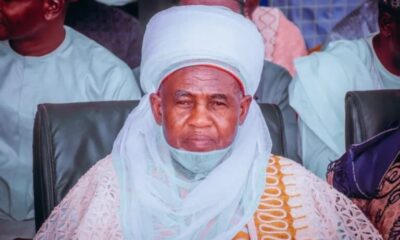

BREAKING: Emir Of Gusau, Ibrahim Bello Dies At 71
-
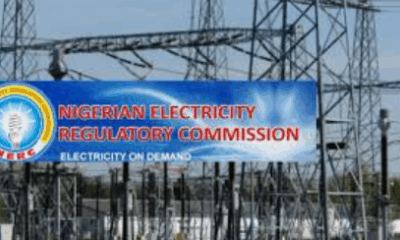

States Slashing Power Tariff Must Pay Subsidy — NERC
-
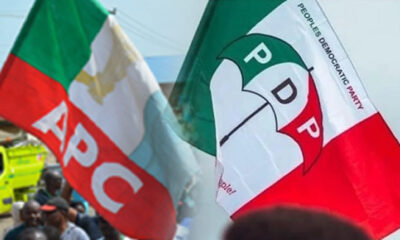

Post-NEC Meetings: APC, PDP Set Stage For Epic 2027 Face-Off
-
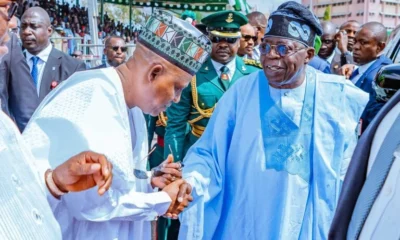

Oil Cabal Fought Back After Subsidy Removal — But Tinubu Didn’t Budge — VP Shettima
-


BREAKING: Humanitarian Minister, Nentawe, Emerges APC National Chairman
-


EFCC Declares 28-Yr-Old Woman Wanted Over Alleged Fraud, Theft
BIG STORY
BREAKING: Emir Of Gusau, Ibrahim Bello Dies At 71
Published
21 minutes agoon
July 25, 2025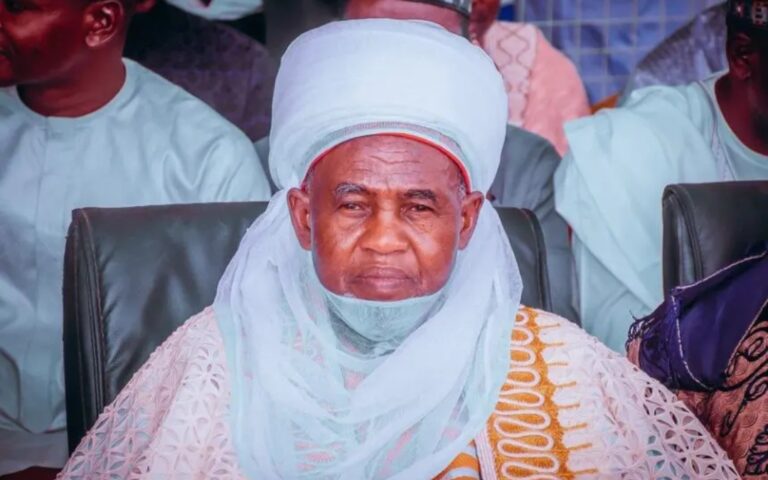
Ibrahim Bello, the Emir of Gusau, has died at the age of 71.
The traditional ruler from Zamfara State passed away on Friday in Abuja after a prolonged illness.
His death was confirmed in a statement by Sulaiman Idris, spokesperson to Zamfara State Governor, Dauda Lawal.
In the statement, Governor Lawal expressed grief over the monarch’s passing and referred to him as a reliable leader.
He also praised the late Emir’s commitment to the peace and advancement of Zamfara State.
“I received with deep sadness the news of the passing of our father, His Royal Highness, Dr. Ibrahim Bello, the Emir of Gusau… I have lost a confidant and a father whose wisdom guides me and other state leaders. May the Almighty Allah (SWT) forgive his shortcomings and grant him Aljannah,” the governor said.
Before becoming Emir, Bello served as a civil servant and rose to the rank of Permanent Secretary in the former Sokoto and Zamfara states.
He became the 16th Emir of Gusau in March 2015 after the death of his father and spent more than ten years on the throne.
Throughout his leadership, he played an important role in the social and cultural development of Zamfara State.
BIG STORY
States Slashing Power Tariff Must Pay Subsidy — NERC
Published
40 minutes agoon
July 25, 2025
The Nigerian Electricity Regulatory Commission has stated that state governments do not have authority over the national grid or power stations established under federal laws or operating with licences issued by the commission.
This clarification came in response to the controversy surrounding the Enugu Electricity Regulatory Commission’s reduction of the Band A electricity tariff.
In a statement on Thursday, the national regulator advised states to fully reflect wholesale costs in electricity tariffs or be prepared to subsidise any shortfall.
The commission acknowledged that states with full regulatory control over their internal markets are permitted to establish and regulate transactions within their state electricity sectors, including creating tariff structures for end-users.
However, electricity distribution and generation companies cautioned that states can only independently set tariffs once they begin producing and transmitting electricity themselves.
In its Thursday statement, NERC warned that “as states do not have jurisdiction over the national grid and over electric power stations established under federal laws/operating under licences issued by the commission; they must holistically incorporate the wholesale costs of grid supply to their states without any qualification or deviation in their design of tariffs for end-use customers in order not to distort the dynamics of the market or be prepared to make a policy intervention by way a subsidy for any deviation in the tariff structure that distorts the wholesale generation, transmission and legacy financing costs in the Nigeria Electricity Supply Industry.”
The commission stressed that no regulatory body should make decisions that would financially compromise the national grid or wholesale market, contrary to the constitutional powers granted to them.
It noted that it had received complaints regarding the Tariff Order (Order No. EERC/2025/003) issued by the Enugu State Electricity Regulatory Commission to its licensee, Mainpower Electricity Distribution Limited, which relies solely on power from the national grid.
NERC stated that stakeholders in Nigeria’s electricity market have expressed concern over the tariff cut to N160.4 per kWh for Band A customers in MEDL’s network and the freeze on tariffs for other customer bands, given the impact on wholesale generation, transmission, and legacy financial obligations. The N160.4 rate was largely achieved by reducing the current average Generation Tariff of N112.60 per kWh to N45.75, assuming a subsidy of N66.85 per kWh.
NERC explained that section 34(1) of the Electricity Act mandates the commission to maintain efficient electricity market structures and ensure optimal resource use. It added that both NERC and EERC share statutory obligations and should avoid actions that could jeopardize the financial integrity of the electricity industry.
The commission said it is currently engaging EERC to resolve any misunderstandings regarding its tariff order and reiterated its commitment to ensuring the market remains financially viable, in line with national law.
Meanwhile, the Association of Nigerian Electricity Distributors and the Association of Power Generation Companies have urged states, including Enugu, to wait until they generate and transmit their own electricity before reducing tariffs.
The CEO of ANED, Sunday Oduntan, cautioned Band A customers in Enugu not to celebrate yet, stating that it is not possible to receive 20 hours of power daily at a rate of N160 per kilowatt-hour.
On Sunday, the Enugu Electricity Regulatory Commission directed MainPower Electricity Distribution Company to reduce the Band A tariff from N209/kWh to N160/kWh, starting August 1.
This decision triggered backlash from generation and distribution firms, who accused EERC of placing further financial pressure on a sector already burdened by N5.2 trillion in government debt.
While EERC said it had done the necessary calculations before deciding on the new tariff, Oduntan argued that no state currently has the authority to independently set power prices unless they control the entire value chain.
Earlier, Oduntan raised alarm over increased refusal by customers to pay electricity bills following the Enugu tariff cut, saying it could destabilise Nigeria’s power industry.
He said that since EERC’s announcement, customers in other states have begun demanding similar reductions, with some refusing to pay at all.
The CEO of the Association of Power Generation Companies, Joy Ogaji, echoed Oduntan’s position, asserting that states cannot independently set prices for electricity they do not produce.
“The fact speaks for itself. The fact that EERC still regulates a product it does not produce at the state level, but from the wholesale market, they cannot unilaterally regulate that price,” she said.
Ogaji added that EERC’s tariff reference to NERC included a subsidy she called imaginary, saying no official government policy confirms such a subsidy, nor does any financing plan exist to manage the sector’s growing debts, which are harming the financial health of power generating companies.
“Their claim based on an imaginary subsidy is baseless. You can’t build something on nothing. Tariff documents are not child’s play. They form the fulcrum for many decisions, including business decisions, potential investors, and so on.
“This regulatory rascality will not be sustainable for decentralisation. Do you even have a justification for claiming a subsidy? Let’s assume there is one in a federal market, you have applied to be independent of? Can you eat your cake and still have it? How do you even claim this subsidy as a state? Unfortunately, we lack leadership in this sector,” she said.
In its response, the EERC said its decision to reduce the tariff had no impact on the cost of power generation. It stated that, based on MainPower’s operational costs, maintaining the previous Band A rate of N209/kWh was not justified.
In a statement, Reuben Okoye, EERC’s Commissioner for Electricity Market Operations, said the commission is working toward creating a sub-national electricity market that is transparent, accountable, reliable, and sustainable. He added that utility service costs would continue to be reviewed to meet the needs of Enugu residents.
BIG STORY
Post-NEC Meetings: APC, PDP Set Stage For Epic 2027 Face-Off
Published
55 minutes agoon
July 25, 2025
Less than two years to the next general election, the ruling All Progressives Congress and the main opposition Peoples Democratic Party are already locking horns in what promises to be a fierce battle for the nation’s top political prize in 2027.
Both parties held their National Executive Committee meetings in Abuja on Thursday and outlined strategic moves in preparation for the election.
Each side also introduced new leadership approaches aimed at winning public support.
The APC is focused on strengthening its hold on power, while the PDP is working to position itself as a viable contender to reclaim the Presidency.
On Thursday, the National Executive Committee of the APC appointed the Minister of Humanitarian Affairs and Social Development, Yilwatda Nentawe, as the party’s substantive chairman.
Imo State Governor Hope Uzodimma, who leads the Progressive Governors’ Forum, put forward the motion to nominate Yilwatda as party chairman.
Governor Uzodimma said, “It will be a thing of joy for me to take advantage of this moment to drive this motion, that I, Senator Hope Uzodima, the Governor of Imo State and Chairman Progressives Governors Forum that I want to humbly move the motion that the National Executive Committee approve the Office of the National Chairman of the APC to be zoned back to the North Central from the North East where it is now, to the North Central geopolitical zone and that the office of the National Legal Adviser of the APC from the North Central where it is now back to North West geopolitical zone.”
“That the Office of the Deputy National Secretary of the APC, already zoned to Northcentral, that Professor Yilwatda Yilwatda from Plateau State North Central Zone be nominated and elected as the National chairman of the APC.”
He added, “That the current National Legal Adviser, Professor Karim Kana shall now be the National Deputy Secretary of the APC. And Barrister Murtala…From Katsina State in the north west be nominated and elected as the National Legal Adviser of the APC.
“Due to the compressed political activities going on in the party, that the tenure of the ward executives and local government executives be extended to December 31, 2025.”
The motion was seconded by the Speaker of the House of Representatives, Tajudeen Abbas. Yilwatda was then elected after a yay-or-nay vote.
His emergence as the party chair is seen as part of the APC’s strategic plan to prepare for the 2027 election.
Yilwatda, 56, is an engineer, academic, and former governorship candidate of the APC in Plateau State during the 2023 general elections.
His emergence as the seventh APC National Chairman follows the resignation of Dr. Abdullahi Ganduje, who stepped down in June, citing health concerns.
Tinubu’s return
Speaking after he was sworn, Nentawe pledged to unify and grow the ruling party as he formally assumed leadership of the party.
He expressed deep appreciation to President Bola Tinubu, APC governors, members of the National Assembly, and all stakeholders for entrusting him with what he called a “big burden” at a critical political juncture.
“I pledge without hesitation that I will work with everybody in the party, unite the party, build the party, expand the party with you as the focus,” Yilwatda said during his acceptance remarks at the emergency NEC meeting held at the State House Conference Centre, Abuja.
“Let me express my profound gratitude to God and the leadership of the party, from the President, to the governors, and the National Assembly members, all members of NEC, for reposing this big burden and trust also in me to lead the party at this juncture.
“Let me thank you also for picking me among millions of members of this party, and that the party will see me good enough and responsible enough to take this party to the next level,” he said.
In outlining his core agenda, Yilwatda, who will step down from his role as Minister of Humanitarian Affairs and Poverty Reduction, called for the support and cooperation of party members.
He promised an inclusive and cooperative style of leadership focused on internal unity, grassroots expansion, and renewed public trust.
After being sworn in by Oghenovo Otemu, Head of Chambers at OGHENOVO O. OTEMU CHAMBERS, he committed to engaging all members of the party as essential stakeholders in its forward journey.
“I do not take this mandate for granted. I want to accept it with gratitude and with my full heart and with my full mind to work together with you, to build the party knowing that all of us here are the mechanics of the party and the party is our vehicle and we are to fix it and move it to our destination of choice,” he stated.
Yilwatda further underscored the importance of working hand-in-hand with party members, saying, “I will work with everybody in the party…and the support I will require to drive the party as needed by all of us so that we can fulfil the dream of Nigerians who have reposed their hope in the renewed hope agenda.”
The new APC chairman closed his speech with a reaffirmation of his commitment to serve with trust and accountability.
He appealed for continued support from the party’s leadership and rank-and-file membership to achieve the goals of the Renewed Hope agenda.
“Lastly, I will trust and look up to the leadership of the party, members of the party, and all of you seated here for us to fulfil the dreams that Nigerians have of APC.”
Upon his assumption of duty at the APC Secretariat, the newly elected chairman pledged to transform the ruling party into a source of national pride and celebration.
He expressed confidence that under his leadership, more governors, senators, and key opposition figures would be drawn into the APC, declaring that the 2027 general election “is a done deal for APC.”
Yilwatda likened the National Working Committee to a team of mechanics and the party itself to a vehicle that requires fixing. He appealed for unity among the party’s leadership and members.
According to him, “All of us here, especially the National Working Committee, we are the mechanics, the party is a vehicle, we will fix it. We will drive it, we will work it out and ensure that we get the destination of our choice.
“Its our collective effort and I’m sure by the time we put our hands on the deck collectively, this party will be great, this party will be the joy and the pride and the bright of the entire nation and that’s what I look forward to this party becoming under our collective leadership.”
Expressing gratitude to Nigerians for their support of the APC, Yilwatda stated that the ruling party had already secured victory in the 2027 election.
He added, “I appreciate Nigerians supporting APC, standing by APC, our doors are open to welcome new members. Our doors are open, we look forward to having more governors, more senators, more National Assembly members, more local government chairmen and more members into our party.
“We will expand beyond bounds. I’m sure by God’s grace, I’m sure the 2027 is a done deal for APC.”
In a related development, the APC National Publicity Secretary, Felix Morka, said in a statement on Thursday that Yilwatda’s extensive experience would contribute to repositioning the party.
The statement read in part, “A prolific academic and governorship candidate of the APC in the 2023 gubernatorial election in Plateau State, Prof. Yilwatda was the serving Honourable Minister of Humanitarian Affairs, Disaster Management, and Social Development until his emergence as National Chairman.
“Professor Yilwatda brings a wealth of administrative, technical and political experience to his new assignment, having served as former Director of Information and Communication Technology, Federal University of Agriculture, Makurdi, and Resident Electoral Commissioner, Benue State between 2017 and 2021, and Director-General of the Plateau State Tinubu-Shettima Campaign Organisation in the 2023 general election.
“We welcome and congratulate our National Chairman on his election, and pray God, in His mercies, to grant him wisdom and grace to lead our great Party to greater heights.”
Nigerians complaining – Tinubu
In his remarks, President Tinubu emphasised the need for increased community engagement and greater responsiveness to citizens’ concerns.
“Nigerians are still complaining at the grassroots,” the President stated, adding, “To you, the governors, you must wet the grass more and deliver progressive change to Nigerians. May God bless our democracy and grant us more fertile lands.
“To those working with me to achieve food sovereignty for our country, we will continue to work hard for you, Nigerians, and to listen to everyone to achieve the national goals,” he noted.
The President reiterated the APC’s inclusive posture and affirmed that the party remains open to new members and fresh ideas.
He dismissed the opposition as “a coalition of confusion” and urged progressive-minded Nigerians to join the APC and participate in its developmental agenda.
“Our doors are still open, and we should wholeheartedly embrace those who join us,” he said.
President Tinubu emphasised that the party’s strength lied in expanding its ranks and encouraged the new National Chairman to establish a committee of National Working Committee members to visit states, ensuring that all new members are seamlessly registered and integrated.
The President thanked Ganduje for his contributions to party development and ideological clarity.
“I gave him an assignment on forming a progressive doctrine and a progressive institute. I believe the National Secretary will help revitalise and coordinate this effort,” the President said.
Turning to the governors, the President urged them to work collectively to leave behind a lasting legacy, including building a party secretariat in Abuja.
“We should leave a legacy of development. The governors are here —23 of them — to help identify a land, along with the Minister of the Federal Capital Territory. We should establish a committee of progressive governors to identify suitable land and construct the secretariat,” he said.
President Tinubu acknowledged economic challenges but affirmed that progress has been made under his administration. He cited the record N14.9tn in revenue collected by the Federal Inland Revenue Service in the first six months of the year, a 43 per cent increase from the amount collected in 2024.
“It is not easy to navigate the stormy waters of economic instability. Now, the economy is stabilised—there is no fear for the country except for continued upward movement and sustained growth. I can assure you,” he stated.
Regarding security, the President noted that significant efforts have been made to restore safety across Nigeria.
“Thousands of terrorists and bandits have been neutralised. You can see that fear is decreasing. However, we must remain vigilant and take the matter seriously. We must invest more in our people, be accommodating, and remain committed to ensuring national security.”
President Tinubu welcomed new entrants into the APC, including Governor Umo Eno of Akwa Ibom State, Governor Sheriff Oborevwori of Delta State, and other key political figures.
The meeting observed a minute’s silence in honour of former President Muhammadu Buhari.
At the President’s request, the meeting also observed a minute of silence in honour of Alhaji Aminu Dantata and Oba Sikiru Adetona (the Awujale of Ijebuland), who both passed away recently.
The President noted that although the two late statesmen were not party members, “their lives and contributions to national development command our respect.”
The immediate past acting National Chairman, Bukar Dalori, noted that the resignation of the former National Chairman necessitated a meeting of the NEC to fill the vacancy. He thanked the President and the Progressive Governors’ Forum for their strategic intervention during the transition period.
Obasa lauds Yilwatda
Meanwhile, Speaker of the Lagos State House of Assembly, Mudashiru Obasa, congratulated the new APC chairman, charging him to ensure that he enthroned a stronger and more virile party that will be indomitable in the 2027 general election.
In a statement signed by his Chief Press Secretary, Dave Agboola, Obasa described Yilwatda as a proper fit for the party’s leadership.
He praised his decades-long contributions to academia, public service, and his pivotal role in Nigeria’s digital transformation, including his tenure as Director of ICT at the Federal University of Agriculture, Makurdi, as well as his extensive consultancy work with global institutions such as the European Union, UNICEF, and the World Bank.
He also cited his sterling and memorable roles as a Resident Electoral Commissioner for the Independent National Electoral Commission and, until recently, Nigeria’s Minister of Humanitarian Affairs and Poverty Reduction.
“Prof. Yilwatda’s commitment to reforming public service through technology aligns squarely with the APC’s mission to uplift communities and drive national progress.
“I have full confidence that your technocratic and political leadership will unite our great party, strengthen our popularity and growth, and chart a bold course for our party as we prepare for 2027,” Obasa stated.
PDP vows takeover
However, while the ruling party celebrated the emergence of a new chairman, governors elected on the platform of the opposition PDP have vowed to challenge the APC ruling and the emerging African Democratic Congress-led coalition ahead of the 2027 elections.
Speaking on behalf of the PDP Governors during the party’s 101st National Executive Committee meeting held in Abuja on Thursday, the Chairman of the PDP Governors’ Forum and Bauchi State Governor, Bala Mohammed, stated that the party would no longer tolerate acts of indiscipline.
He noted that internal crises triggered by indiscipline had recently been addressed and resolved.
Ahead of the 2027 polls, several high-profile politicians have defected to the ADC-led coalition, including former Vice President Atiku Abubakar, former Senate President David Mark, and ex-presidential aspirant Dele Momodu.
On the other hand, some PDP leaders have also crossed over to the APC.
They include Akwa Ibom State Governor Umo Eno, Delta State Governor Sheriff Oborevwori, and the party’s 2023 Vice Presidential candidate, Ifeanyi Okowa, among others.
The Bauchi State Governor affirmed their commitment to reviving the party and delivering hope to Nigerians.
Mohammed stated, “We will not continue to condone indiscipline in this place, because indiscipline is what brought us all the problems and challenges.
“Definitely, the party has shown resilience, and the governors are going through a lot of challenges, just like the NWC. We will continue to express confidence in the organs of the party.
“We are ready to work with you so that no personal interest will divide us.
“Our ambition is not more important than the nation. We must be able to hide our personal ambition, either as governors or those seeking the presidency so that we can leave a level playing field,” Mohammed stated.
He added, “Now, with the necessary recognition by the regulator, INEC, at the end of the day, we’ll give the APC political competition a run for their money in terms of contest that will be given on a level playing field, with a party that is intact, and also give answers to our people wishing to come in.
“In terms of whatever permutation or conjecture we call it whether it is coalition, whether it is alliance it is the PDP that should be able to drive it, because it is the main opposition party.”
The Bauchi State Governor stated that the party sympathises with those who left out of impatience, noting that the door will remain open for their return though only for a limited time.
“This is a long way we have traveled. This is how PDP is known, a party with a history, with a logo that has not changed over the years, the party that has shown resilience, and we have the governors solidly behind all the organs of the party.
“We don’t have to make a lot of noise. We are working behind the scene, behind the NWC, behind the BoT, the caucuses of the National Assembly and the six chapters to ensure that we remain intact and provide a credible platform for Nigerians to actualize their aspirations.
“As the BoT Secretary has said, This is not time for calling names. This is not time for abusers. We sympathise for those who became impatient and left but certainly they will understand and we would still leave the door ajar for them to come in when they wish to, within a time limit,” he stated.
Earlier in his remarks, PDP’s acting National Chairman, Umar Damagum, expressed confidence in the eventual collapse of the recently formed opposition coalition ahead of the 2027 presidential election.
Damagum stated, “I have no charge beyond this; that we deliberate sincerely and make decisions that serve the interest of the PDP and the Nigerian people. However, I must address the matter of a so-called coalition recently formed, which includes some defecting members of our party.
“On this issue, I am pleased to report that this political experiment is nothing to lose sleep over. They say a bird in hand is worth two in the bush. Some persons have recently learned this truth in the most uncomfortable way. Many who jumped on the coalition bandwagon have already returned to our fold. Some even claim they never left and merely attended a meeting, we accept their confessions without prejudice.
“Let me add that this reversal is not limited to PDP members alone. Individuals from other political parties who initially joined this coalition have realised that the venture is ill-fated and their swift return is proof of this.
“The Peoples Democratic Party remains the only party that is not only poised and ready to take back power, but also the only party with the structure, national acceptability, and legacy capable of bearing the weight of this great national undertaking. To close this matter, I believe that all of us look forward to the total dismantling of this ill-fated coalition, even as we extend our best wishes to those involved.”
He further expressed gratitude to party stakeholders for their unwavering commitment and praised the state chairmen for their efforts.
He stated, “Let me begin by appreciating our state party chairpersons, who are the first line of defence in our democratic struggle. It is from your leadership that our grassroots structures are nurtured and sustained.
“Your resilience, especially in states where we are in opposition, is commendable. We recognise the burdens you carry and salute your unwavering commitment to the party. You are comrades in the trenches of democracy.
“I also extend my heartfelt appreciation to the Minority Leaders of both the Senate and the House of Representatives, as well as all our legislators in the National Assembly. You have represented the values of our party with integrity and tenacity. I must emphasise that it is because of your steadfastness that when we eventually reclaim the presidency, the next PDP president will not be a political orphan left to the mercy of hostile forces.
“Beyond electoral victories, our legislators play a crucial role in both governance and party life. Through your actions, anti-people policies are challenged and checked. You serve as role models to our state assembly members, who themselves are doing tremendous work delivering the dividends of representative democracy and supporting the executive arm in PDP-led states.”
Damagum also hailed the governors as the backbone and pride of the party.
“You remain the backbone of this party, and without your leadership and sacrifice, we would be left exposed. We are indeed fortunate to have you.”
Meanwhile, the PDP 101th NEC has shifted its National Elective Convention originally planned for August to November 2025.
Addressing a press conference after the NEC meeting, PDP National Publicity Secretary, Debo Ologunagba, announced that the convention would now take place in Ibadan, the Oyo State capital, instead of the previously announced venue, Kano.
Ologunagba, while presenting the communiqué at the conclusion of the 101st NEC meeting, also announced that the 102nd session has been rescheduled to take place in August.
The PDP National Publicity Secretary, flanked by other party leaders, stated, “NEC expressed satisfaction over the resolution of all contentions and disagreements within the Party which again demonstrates the engrained patriotic disposition of PDP members and our Party’s democratic principles of dialogue, mutual understanding and commitment to the overall interest of the PDP and the common good of all Nigerians.
“NEC reassures all party members and Nigerians that the PDP remains a strong, united, cohesive, stable and focused political party repositioned to effectively play its role as the leading opposition Party in galvanising all efforts towards rescuing our dear nation from the catastrophic misrule of the All Progressives Congress.
“Pursuant to the foregoing, NEC approved the year 2025 Elective National Convention Schedule of Activities and Timetable. Under the approved Timetable, the Elective National Convention to elect the next set of National Officers of our Party will hold on Saturday, 15th to Sunday, 16th November, 2025 in Ibadan, the Oyo State Capital.
“Consequently, NEC directed the National Chairman, His Excellency, Amb. Iliya Damagum and the National Secretary, Senator Samuel Anyanwu to officially write to inform the Independent National Electoral Commission of the time, venue and agenda of the Elective National Convention in accordance with the requirement of Section 82 (1) of the Electoral Act, 2022 and Part 2(12) of the Regulations and Guidelines for Political Parties, 2022.”
According to the communiqué read by Ologunagba, NEC also approved the composition of both the National Convention Committee and the Zoning Committee to ensure a transparent and credible Elective National Convention.
The communique read in part, “In its determination to preserve all the electoral mandate given to our Party by Nigerians across the country, NEC directed the National Working Committee to take immediate legal action to recover the seats of all serving members of the National and State Assemblies elected on the platform of the PDP but defected to another Party.
“By virtue of the self-executory provision of Sections 68 (1) (g) and 109 (1) (g) of the Constitution of the Federal Republic of Nigeria, 1999 (as amended) such defectors have irredeemably lost their seats, there being no division or merger with regard to the PDP.
“NEC expressed serious concern and frowns at the reported participation and involvement of some Party members in the activities, meetings and gathering of another political party. NEC calls on these members to reconsider their actions and show loyalty and commitment as members of the PDP especially as the law does not permit membership of two political Parties at the same time.”
The PDP NEC reassured its members of the progress made in addressing concerns related to the party.
According to the communique, “NEC restates that the PDP as the leading opposition Party and platform of choice for all Nigerians remains open in working with other well-meaning and like-minded citizens in the collective effort to rescue our nation from the stranglehold of the rudderless and insensitive APC administration.
“NEC reassures of PDP’s belief in Democracy, and its commitment and readiness to be at the forefront in driving the aspiration of Nigerians to oust the APC and install a people-oriented government on the platform of the PDP come 2027.”
Earlier at the 81st Board of Trustees meeting held on Thursday at Wadata Plaza in Abuja, PDP BoT chairman, Adolphus Wabara, represented by BoT secretary, Ahmed Makarfi, stated that the outcome of the November Elective Convention would send a strong message to Nigerians.
He stated, “We have to build on that stability, but we must never take things for granted, because for one reason or the other, some of our friends and associates have left us. I don’t believe they have left us for good. I believe, when you look at the agenda, the success of the items scheduled is what will bring most of them back. I cannot say all of them, but we can even bring new hands into the PDP.
“So the ball is in our court, not only to discuss and approve the items on the agenda, but to make sure the outcome of the scheduled National Convention sends a strong, positive message to Nigerians, because that is what is going to define the political landscape in this country.”
He also urged party leaders to be mindful in their reactions to defectors, noting that the party would welcome their return.
The BoT chairman stated, “I urge all members to be cautious of what they say or do. Some cannot be working to rebuild the party, and others trying to demarket it.
“There is a difference between personal opinion and party position. If anybody is speaking on personal opinion, he or she should say so. The party has formal organs for speaking, and that should be respected.
“We must never show to the public that we are a group where anybody can do what he or she likes anytime and anyhow. We must be cautious of each other by what we do or what we don’t do as we move forward.
“I will also advise that, yes, we may have differences, but we should be conscious in expressing opinions, even on those who have left us, because what we want is for them to come back now or very, very soon.
“We know that some people are aggrieved, but we have to come down and pull down whatever our grievances may be. If we work together, the convention should resolve all grievances. It’s an opportunity, and we must not miss it. We should be patient and make use of it.”
Also, Dr Bukola Saraki, who headed the PDP Reconciliation and Strategy Committee to resolve the crisis in the party, expressed satisfaction with the peaceful outcome of the NEC meeting.
He said, “I am particularly elated that with the success of today’s (Thursday) meeting, the Reconciliation and Strategy Committee headed by me has achieved parts of the mandate given to us by the PDP Governors Forum on May 12, 2025.
“We were mandated to clear all obstacles preventing the party from holding its NEC meeting and moving on to have a hitch-free national convention.
“The outcome of today’s meeting is an indication that our committee is delivering on our assignment. The NEC meeting was successfully held. Also, the machinery for a successful convention has been set in motion.”
In addition to the Bauchi State Governor, Damagum, Makarfi and Saraki, those present at the meeting included Governors Ademola Adeleke (Osun), Dauda Lawal (Zamfara), Caleb Mutfwang (Plateau), Agbu Kefas (Taraba), and Ahmed Fintiri (Adamawa).
Also in attendance were former Osun State Governor Olagunsoye Oyinlola, former Niger State Governor Babangida Aliyu, former Bayelsa Governor Seriake Dickson, former Benue Governor Samuel Ortom, Senator Abba Moro, Chief Olabode George, and former Minister of Special Duties, Tanimu Turaki, among others.
From the National Working Committee were National Secretary Samuel Anyanwu, Deputy Secretary Setonji Koshoedo, and Deputy National Vice Chairman (South) Taofeek Arapaja.
Credit: The Punch
Most Popular
-
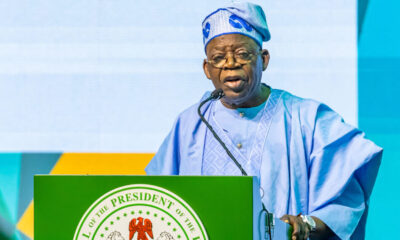
 BIG STORY4 days ago
BIG STORY4 days agoTINUBUNOMICS: Nigerian Stocks Are Experiencing Their Best Run Under Any President Since 1999 — Report
-

 BIG STORY4 days ago
BIG STORY4 days agoMuhammed Babangida Accepts BOA Chairmanship, Thanks President Tinubu
-
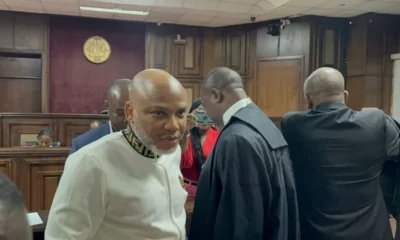
 BIG STORY2 days ago
BIG STORY2 days agoIgbo Youth Forum Threatens To Boycott 2027 Polls If Nnamdi Kanu Isn’t Released, Ready To Stage 10 Million Man March In Abuja
-

 BIG STORY4 days ago
BIG STORY4 days agoEnjoy Your Adopted Home, Shehu Sani Knocks Badenoch
-

 BIG STORY3 days ago
BIG STORY3 days agoAWUJALE: Ogun Government Prepares For Legal Battle With Ifa Council
-
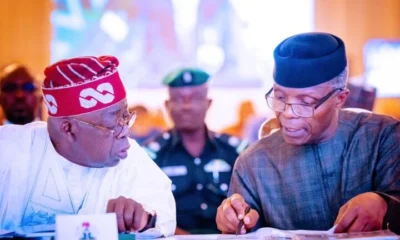
 BIG STORY1 day ago
BIG STORY1 day agoTinubu, Osinbajo, Governors To Attend APC NEC Meeting As Party Plans Tribute For Buhari
-

 BIG STORY3 days ago
BIG STORY3 days agoBREAKING: Natasha Arrives As National Assembly Beefs Up Security
-

 BIG STORY1 day ago
BIG STORY1 day agoBuilding A Cleaner Lagos: Environment Commissioner Tokunbo Wahab Backs LAWMA’s Triad of Education, Collaboration — By Babajide Fadoju









